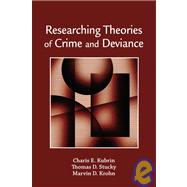
Note: Supplemental materials are not guaranteed with Rental or Used book purchases.
Purchase Benefits
What is included with this book?
| Preface | p. ix |
| Acknowledgments | p. xi |
| Introduction | p. 1 |
| Theory | p. 2 |
| Methods | p. 5 |
| Summary | p. 19 |
| Discussion Questions | p. 20 |
| Rational Choice and Deterrence Theories | p. 21 |
| Introduction | p. 21 |
| Intellectual History of Deterrence and Rational Choice Theories | p. 21 |
| Modern Deterrence and Rational Choice Theories | p. 22 |
| Routine Activities Theory | p. 24 |
| Concepts and Measurement Issues | p. 25 |
| Analytical Issues | p. 41 |
| Directions for Future Research | p. 47 |
| Discussion Questions | p. 48 |
| Trait Theories | p. 49 |
| Introduction | p. 49 |
| Intellectual History of Trait Theories | p. 49 |
| Modern Biosocial Theories | p. 50 |
| Concepts and Measurement Issues | p. 56 |
| Analytical Issues | p. 76 |
| Directions for Future Research | p. 80 |
| Discussion Questions | p. 81 |
| Social Disorganization Theory | p. 82 |
| Introduction | p. 82 |
| Intellectual History of Social Disorganization Theory | p. 83 |
| Social Disorganization Theory | p. 87 |
| Concepts and Measurement Issues | p. 93 |
| Analytical Issues | p. 99 |
| Directions for Future Research | p. 103 |
| Discussion Questions | p. 105 |
| Anomie and Strain Theories | p. 107 |
| Introduction | p. 107 |
| Intellectual History of Anomie and Strain Theories | p. 107 |
| Modern Anomie and Strain Theories | p. 107 |
| Concepts and Measurement Issues | p. 111 |
| Analytical Issues | p. 129 |
| Directions for Future Research | p. 135 |
| Discussion Questions | p. 136 |
| Social Learning Theories | p. 137 |
| Introduction | p. 137 |
| Intellectual History of Social Learning Theories | p. 137 |
| Differential Association Theory | p. 138 |
| Social Learning Theory | p. 140 |
| Concepts and Measurement Issues | p. 142 |
| Analytical Issues | p. 159 |
| Directions for Future Research | p. 164 |
| Discussion Questions | p. 166 |
| Control Theories | p. 167 |
| Introduction | p. 167 |
| Intellectual History of Social Control Theory | p. 168 |
| Social Control Theory | p. 169 |
| Concepts and Measurement Issues | p. 173 |
| Analytical Issues | p. 180 |
| Directions for Future Research | p. 185 |
| Self-Control Theory | p. 186 |
| Concepts and Measurement Issues | p. 189 |
| Analytical Issues | p. 192 |
| Directions for Future Research | p. 195 |
| Discussion Questions | p. 196 |
| Labeling Theory | p. 198 |
| Introduction | p. 198 |
| Intellectual History of Labeling Theory | p. 200 |
| Labeling Theory | p. 201 |
| Concepts and Measurement Issues | p. 208 |
| Analytical Issues | p. 213 |
| Directions for Future Research | p. 216 |
| Discussion Questions | p. 217 |
| Conflict Theory | p. 219 |
| Introduction | p. 219 |
| Intellectual History of Conflict Theory | p. 220 |
| Conflict Theory | p. 225 |
| Concepts and Measurement Issues | p. 234 |
| Analytical Issues | p. 239 |
| Directions for Future Research | p. 244 |
| Discussion Questions | p. 245 |
| Integrated Theory | p. 247 |
| Introduction | p. 247 |
| Intellectual History of Integrated Theory | p. 247 |
| Integrated Theory | p. 250 |
| Analytical Issues | p. 273 |
| Directions for Future Research | p. 279 |
| Discussion Questions | p. 281 |
| Conclusion | p. 282 |
| Common Measurement and Analytical Issues | p. 283 |
| What Is the Future of Criminological Inquiry? | p. 287 |
| References | p. 291 |
| Index | p. 341 |
| Table of Contents provided by Ingram. All Rights Reserved. |
The New copy of this book will include any supplemental materials advertised. Please check the title of the book to determine if it should include any access cards, study guides, lab manuals, CDs, etc.
The Used, Rental and eBook copies of this book are not guaranteed to include any supplemental materials. Typically, only the book itself is included. This is true even if the title states it includes any access cards, study guides, lab manuals, CDs, etc.